 Sometimes we fall into the trap of thinking we are doing everything right – and WE STILL CAN’T LOSE WEIGHT. Let’s face it. It’s hard to eat right all the time, day in and day out to get the results we want. And sometimes we make excuses or justify our choices even though we know deep down it’s probably not the right choice. If we get honest with ourselves and really examine our daily habits, we can uncover some areas where we know we can do better. 1. It’s quinoa, I can have as much as I want. Nuts, whole wheat pasta, quinoa, avocado and dark chocolate are natural and healthy – but they are not without calories. A handful of nuts is a healthy choice, but do you stop at one handful? An avocado has tons of health benefits but contains over 200 calories per fruit. How many times have you eaten the entire fruit? Do your homework on the healthy foods you are consuming and understand what constitutes a serving. 2. I parked at the far end of the mall parking lot. While this is a good strategy to get some healthy steps in your day, this does not count as your workout for the day and you know it! Get out and sweat for at least 30 minutes and burn some serious calories. 3. Working out on an empty stomach will burn more fat. A recent research study published in the Journal of the International Society of Sports shows that doing so burns calories from muscle, not fat. Since muscle burns more calories than fat, the more muscle mass you have the better it is for weight loss. Plus, eating before your workout will give you more energy to push yourself through a great sweat session! 4. I had ice cream, but it was low fat! You are deceiving yourself thinking that low fat, low sugar or sugar free foods are helping you lose weight. They are often filled with extra sodium, sugar and chemicals to enhance the flavor and leave you feeling less than satisfied and hungry for more which may lead to over indulging. Sometimes we’re better off having a small portion of the “real thing” and moving on. 5. I just had a handful – it doesn’t count. A handful of what, and how many times during the day did you have a handful? If you stop and think about the calories in that small portion and multiply it by the 4 or 5 times you consumed that handful in a day, it could easily add up to several hundred extra calories. You have a craving for some chocolate, so you decide to have a tablespoon of chocolate chips which contains 70 calories. Can you stop at one? You dip into that bag 3 or 4 times a day and you’ve got almost 300 extra calories. If you bite it, write it! Honest food logging is a valuable tool to weight loss- holding you accountable to every bite of food. Just because it wasn’t part of your meal, doesn’t’ mean it shouldn’t count towards your total caloric intake for the day. So if you find yourself frustrated with weight loss – take a long, hard look at your daily habits. We can all find an area for improvement. Don’t kid yourself, and soon you’ll be on the fast track to healthy weight loss and achieving your goal. Honesty is the best policy. -Author Coach Sue Derr
3 Comments
 Recently, I overheard one client jokingly warn another to “be careful drinking the water at emPower because everyone is getting pregnant!” I truly love the humor clients bring everyday! But what wasn't so humorous was the confusion I felt as a newly pregnant personal trainer trying to figure out what was safe for my workouts, and what I should avoid! I am currently in my sixth month of pregnancy with my first child, and by no means claim to be an expert in this field, but I can tell you what the experts suggest! It can be challenging to navigate all the input from well-meaning friends, family and old wives tales. Here are a few brief guidelines I’ve found to be helpful:
Bottom line, always check with your doctor before exercising! If given the approval, make sure to get in as much exercise as you can for the sake of yourself and your baby! And be gracious with yourself, making sure to listen to your body’s needs. During this time, you are growing a baby, so rest is very important too. Overdoing it won’t help anyone…including your little one. And from a personal training point of view…don’t be afraid to continue strength training! This will be a perfect time to maintain the muscle you have, support your body through it’s many changes, and get back into shape much faster postpartum! Cheers to all you mommas hitting the gym! -Author: Coach Tiffany Horst 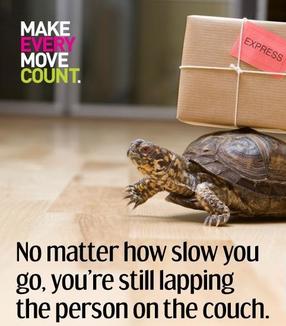 "Lose 10 lbs in 10 days!" "30 lbs in a month!" "Lose 2 sizes in 2 weeks!" These catchy promises sell us! Fueled by feelings of disgust, frustration, and disappointment with ourselves, we channel our best energies and money into a 2 week, 10 day or 30 day program. And most of us can get the promised results if we have enough willpower to push through these intense and short challenges. And then? Fast forward one year…research shows us that 95% of us will gain all of that back!* With all the food deprivation, hours in the gym and money spent on products/programs, we could have sat on the couch and had the same results! These promises are unfinished sentences. Statistically, the phrase should say “Lose 10 pounds in 10 days and gain it all back;” or “lose 30 pounds in a month by this deprivation diet and ruin your metabolism!” Let’s keep a level head. If we made 2 or 3 sustainable changes to our lifestyles (nutrition and exercise) and lost 1 pound per week, over the course of a year, we would be 52 pounds lighter without restriction, frustration and starvation! Even better, these small changes would become ingrained as habits so that you would actually be living and eating better. My challenge to you is to readjust your mindset! Slow is sexy! 1. Respect your body! It took years, maybe a decade, for your body to accumulate excess fat and lose muscle. Isn’t it amazing that your body can reverse that in much less time?! The amount of time will be directly proportional to the amount of weight you’ve accumulated (it may take 6 months to lose 20 pounds, or 1 ½ years to lose 100 pounds). Your body is an amazing organism, with the ability to transform itself in 6 months to 1 ½ years! Give it the time that it needs to do so. 2. Enjoy the process. People hate “dieting!” To most people, it means restriction, hunger, temptation, willpower, and eating food you don’t enjoy. These negative feelings kick in when you try to lose weight as fast as possible. You can enjoy the process by focusing on the healthy foods you love that will help you lose weight! Focus on the good stuff you DO want instead of the unhelpful food or drinks you shouldn’t have. Give yourself time to allow your body and taste buds to enjoy that good stuff so that it becomes a natural desire and habit! That will NOT happen in 30 days! Give it time. 3. Adjust your expectations! You can build healthy habits, enjoy life with the occasional treat/alcohol/party/dessert and still look and feel better, wear smaller clothing, and weigh less at the end of the year! But it’s not going to happen on a fad diet, crash diet, cleanse diet, or any other fast weight loss promise! So get on the scale each week and celebrate the one pound or half pound loss! The biggest adjustment to be made is in your perception of success- your “buy-in” to a long term goal. Many people get disappointed or upset if the scale doesn’t move more than 1 pound per week, revealing their lack of long-term perspective. Fast weight loss is exciting, but short-lived and leaves you overweight, discouraged with yourself, and no better than you were when you started. Fast weight loss is exciting; but slow, sustainable weigh loss is SEXY! *Research found here: https://www.livestrong.com/article/438395-the-percentage-of-people-who-regain-weight-after-rapid-weight-loss-risks/ Author: Coach Angela Myers Saturday, May 30th turned out to be a hot, humid morning with a hint of taunting breeze. Yet for most of the 85 5K participants, the heat wasn't on the forefront of their minds as the clock rolled to 8:59 am. With hearts pumping and sweat rolling at the mere thought of the 3.1 miles that lie ahead, participants began the race at 9:00 am. 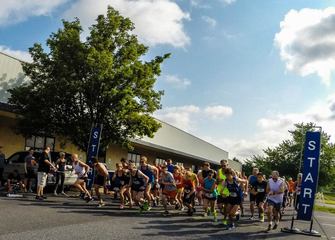 The race course commenced at the emPower Training System's door, wound through Granite Run Park, rolled around the neighborhood, and ended back near the starting line. Race volunteers, including emPower trainers and clients, directed participants through various turns and a water station, cheering along the way. Most would agree that volunteering was nearly as fun as racing itself! Matt Herring finished first with a time of 16:23, with Leah Maher coming in as the top female finisher at 19:08. While some participants managed to PR in the race, for others it was a special race for other reasons. For emPower client, Sandy Smoker, it was her very first 5K race! Here she is beaming as she approaches the finish line. She is already dreaming about her next race! When asked for feedback about the race, everyone agreed that they appreciated how well-organized the race was and how helpful the volunteers were in directing the participants. The Rita's Italian ice was a hit, and the refreshments were enjoyed by all. Overall, this was a special day for individuals, families, and all ages alike!
One couple summed it up well: "It was a perfect 5K course. It was safe, not too flat, and there was a breeze just when we needed it! Very well organized!" When asked if they would run it again they exclaimed, "absolutely!"  What is the most important part of athletic performance? Speed? Agility? Power? I’m going to confidently argue that in order to be faster, more agile, and more powerful, an athlete must first be stronger! Imagine a glass of water. Think of strength as the glass itself. The water in the glass is your agility, power, speed and speed endurance. Since most young athletes have not developed strength, their “glass size” limits their speed development. In order to be a faster, stronger, more agile athlete, the athlete needs a bigger glass (increasing strength), so it can hold more water! Increasing the size of the glass increases the athlete’s potential. Let’s take a look at one component of a great athlete, the element of Speed. Speed on the field is determined by the ability of an athlete to produce force from the ground. The only way to generate more force is to get stronger, which happens through strength training (building a bigger glass!). The stronger an athlete is, the more force they will be able to produce- and for longer- allowing them to outperform everyone else on the field. Not only does this new strength (force development) increase the athlete’s speed (the amount of water in their glass), but it also helps an athlete hit better, throw faster and jump higher. Speed and Agility Camps/programs have become popular for youth, but their focus is on getting more “water” without increasing the “size of the glass”! These programs are not developing base strength to develop an overall well rounded athlete. Another invaluable benefit of strength training is injury reduction. Research pertaining to non contact sports demonstrates that injuries are either a result of a muscular weakness, or a lack of proper positioning required for force production. These injuries can be avoided if an athlete has the proper strength to control movements such as throwing a pitch, decelerating and/or cutting on the field, etc. There is a time and a place in athletic programs for agility and speed drills, but an excellent Athlete Development Program begins with strength development. emPower is excited to provide an Athlete Development Program that is like no other in our area. The program will last 10 weeks, which ensures sufficient time for growth and progression. Athletes will be assessed individually to determine their specific mobility, strength, and core functions. They will have a program written for them, which will develop strength, power, agility, and speed over the summer. Details: -$400 for the program ($300 if you sign up with a friend/teammate/sibling) -Minimum Age 12 years old (junior high) -9 weeks of training, 2 sessions/week (total of 18, can accommodate for vacations) -Training sessions are Mon/ Wed/ Friday 11am (includes Open Gym 11-1 on these days as well) -Program runs June 15-August 14 -Contact Patrick Hagen to register: hagen_patrick1@yahoo.com By Patrick Hagen, Strength and Conditioning Coach Many of us listen to music while we workout. No, I’m not talking Jane Fonda’s Workouts. And I know some of you enjoy the music some days, and some of you would choose something completely different to listen to while you are working out. Thanks to technology, there are plenty of great music apps you can download for exercising. Most of them will allow you to create and save personal playlists, or select a specific style of music. Check out your phone’s App Store, and I am sure you will everything from Pandora to Rdio to Beats Music to Spotify, and plenty more.
Let’s take a look at how music can change our workout...from a research standpoint. But first, here is a look at 5 reasons why we should listen to music (adapted from the Huffpost Healthy Living blog).
Here are few articles you can check out: ACE Fitness IDEA Scientific American So, what are you waiting for? Pick your music, get those headphones on, and go crush that next workout! Sincerely, Coach Keith 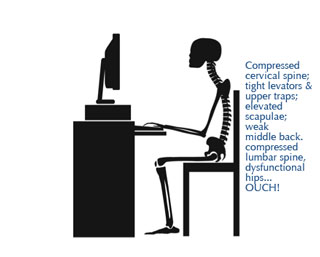 Today’s post will be for a large majority of the population, people who spend a good portion of their day sitting at a desk!! The more technology progresses, the more people sit and stare at a screen for large periods of time, whether it is for a job, for school, or for entertainment. Prolonged sitting has started to rear its ugly head in the form of bad posture as well as nagging mobility limitations for the chronic desk. The first problem this epidemic presents is the loss of vestibular system use. When an individual looks at a screen all day they don't move their eyes or head enough to excite the vestibular system. The average layperson might not find this important. However, every muscle in the body and every sensory system is attached to the vestibular system. The vestibular system controls balance, posture and reflexes. Motion feeds the vestibular system, which helps nourish the brain and shape the body. This can be easily fixed by pausing desk work periodically and looking around; up, down, left to right. Intentionally moving ones eyes and head will excite the vestibular system. The next issue in need of correction is breathing pattern. When an individual sits all day, breathing is predominantly in the chest, using muscles in the upper back and neck. This is not how humans were made to breathe; but rather, these are emergency breathing muscles. Human beings were meant to breathe into the diaphragm. Babies are the perfect example of diaphragmatic breathing and usually only resort to chest breathing when sick. This incorrect breathing pattern can be corrected with crocodile breathing. Here’s how: lie face down with the forehead on the tops of hands and relax. Next, take a deep breath in through the nose, sending air down into the pelvis. The stomach should expand into the floor as if an inner tube around the stomach is being inflated. Take 10 deep breathes at any point throughout the day. An additional issue caused by prolonged periods of sitting is pain in relation to the thoracic spine. This is the middle part of the spine, which usually tightens up after time spent sitting (shoulders will be rolled forward and the upper back will be rounded). This can cause issues from lingering shoulder pain to low back problems and can be addressed with the following correctives:
The last issue in need of correction is the hip. Individuals who sit all day start to create tightness in the front of their hips and quads. This can lead to lower back and knee pain. Here are a few corrections for this issue:
3. Single leg bridge – Lying on his/her back, an individual will pull and hold one knee into their chest. The other leg will be bent with the heel pressing into the floor, spaced about a foot from the butt. Lifting the toes and bracing the core, he/she will press through the planted heel, driving the hips to the ceiling. This position will be held at the top for a second or two, lowered back down and repeated for 10 repetitions each side. Single Leg Bridge These correctives should be implemented into the daily routine of anyone who spends long periods of time seated. Breaking every few hours from deskwork, pick one or two exercises to perform from this list. These can also be done at home, after a long day of sitting at the desk. If you’d like to learn more about this, please contact me, Patrick Hagen By Personal Trainer, Carla Beam 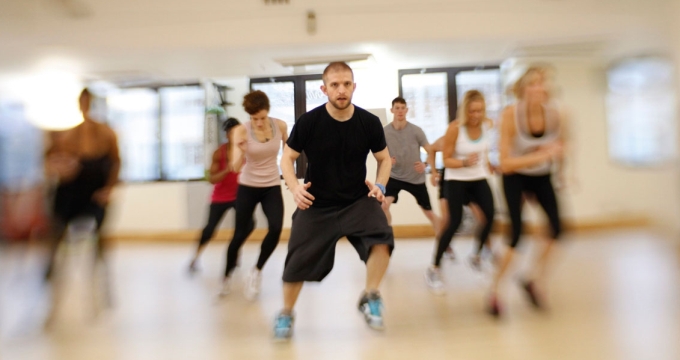 Did you do your intervals today? Interval training can supercharge your fitness, boost your metabolism, burn off extra fat and get you rapidly moving towards your goals! So, whether you want to shake up your normal workout routine or want to burn more calories in less time, incorporate interval training into your weekly routine. $8 a class for the 1st month only. $50 monthly after the 1st month. These classes are included in the personal training package! We also offer punch cards: 10 classes for $75 Days/Time: Mon. & Wed. 6 AM Sun. 7 AM What is interval training? It's simple: interval training is simply alternating short bursts of intense activity 30 seconds to 1 minute) with longer intervals of lighter activity (1-2minutes). It’s secret to success is not how many calories you burn during the workout, but rather on how many you burn after the exercise -- and where these calories come from. An "after-burn effect" or EPOC (excess post-exercise oxygen consumption) occurs in the body after intense exercise drains muscles of their built-in energy source. It can take up to 24-48 hours for this energy to be replenished. During this time, your body must draw upon your fat reserves for energy. So, for the next 24-48 hours while you sit at work, watch TV or have a peaceful nap, your blood cells are rushing around grabbing fat to replenish the energy drained from your muscles. EPOC is just the immediate benefit: over time, Interval training programs the body to funnel new energy (calories that you consume) to the muscles instead of sending them to your fat stores! The muscle’s ability to store energy increases, so your demand for fat release goes up. The more you do interval training, the more of a fat-burning machine you become! A few more benefits of regular interval training: 1. Efficient -- Whether you want to fit a workout into your lunch break or to get in shape for a fast-approaching event, research shows that you can achieve more progress in a mere 20 minutes of interval training (done 3 x wk) than jogging on the treadmill. 2. Burn More Fat -- Not only do you burn more calories during high intensity interval workouts, but the effect of all that intense exertion kicks your body's repair cycle into overdrive. That means you burn more fat and calories in the 24 hours after an interval workout than you do after a steady-pace run. 3. Healthier Heart -- Most people don’t push into the anaerobic zone -- that place where you can't breathe and you feel like your heart is trying to jump out of your chest). But in this case, extreme training produces extreme results. A recent study found that, after 8 weeks of doing high intensity interval workouts, subjects could bicycle twice as long as they could before the study, while maintaining the same pace. 4. No Equipment Necessary -- Running, biking, jumping rope, and rowing are all good for intervals, but you don't need any equipment. High knees, fast feet or anything plyometric, such as jumping lunges work just as well to quickly raise your heart rate. In fact, some equipment like dumbbells can make intervals less effective because you want the focus to be on pushing your heart to its max, not your biceps. 5. Lose Weight, Not Muscle -- Anyone who has been on a diet knows that it's hard to avoid losing muscle mass along with fat. While steady-state cardio seems to encourage muscle loss, studies show that weight training and interval training both allow dieters to preserve their hard-earned muscles while ensuring that most of the weight loss comes from fat stores. 6. Increase Metabolism -- In addition to burning more fat and building more muscle, interval training stimulates production of your human growth hormone (HGH) by up to 40-50% during the 24 hours after you finish your workout. HGH is responsible for increased caloric burn and also slows down the aging process, making you younger both inside and out! 7. Do It Anywhere – Because it's such a simple concept—go at maximum effort for a short period of time followed by a recovery period and repeat—you can adapt it to whatever time and space constraints you have. 8. Challenging -- This format offers seasoned exercisers a new challenge and new exercisers a quick way to see results. The more you do interval training, the more of a fat-burning machine you become! You can do interval training at home and with us! - Personal Trainer, Carla Beam Here at emPower we don’t train just anybody. We train committed, inspired and
driven individuals. We think of everyone as an athlete, regardless of age or fitness level. Our goals might be diverse – fat loss, athletic performance, general fitness, etc. – but our passion for a life of true wellness and our drive to work for what we want is what brings us together. You know you train at emPower when... 1. You leave with a sweat-soaked shirt and black knees. Because the workout’s not over until you’re crawling on the floor (no, really). 2. You say “birthday”, we say “burpees”. Birthday, BURPEES! 3. You see something heavy outside of the studio and think, “I could lift that”. 4. Every time you sit down to a meal you ask yourself, “where’s my protein?” 5. You look forward to being sore (just a little bit) after a new routine. 6. You get a crazy amount of joy from mastering a lift or move you’ve been working toward for weeks. 7. Your friends have no idea what kettlebells are, and you’re happy to explain. 8. Your hands are covered in calluses...and you’re super proud of it. 9. People around you are working out barefoot...and it’s no big deal. 10. Every day is a Pandora playlist battle. Classic Rock? Hip Hop? Rap!? 11. Getting on the ‘Brag Board’ is a big deal. #daymade 12. When people reference your family you say, “which one?”, because the community is just that good. - Nicole Cascio By Angela Myers
If your goal is to lose fat as fast as possible, it is crucial that you focus your efforts on maximizing your production of the powerful fat burning hormone known as human growth hormone (HGH). Our metabolism prefers to burn glucose for fuel, but HGH forces the body to burn fat for fuel! It raises metabolism both directly and indirectly, by promoting muscle tissue which leads to higher metabolism. HGH is released by the pituitary gland, and the levels in the body tend to peak during puberty, and then slowly decline with age. For years, bodybuilders have injected synthetic HGH to experience the beneficial effects it has on their body to create a leaner composition. Unfortunately, the synthetic version of this hormone is very expensive, hard to obtain and causes undesirable side effects. The good news is that you can increase your HGH levels naturally, and without any residual side effects. Listed below are the four most effective ways to challenge your body to release more of this hormone: 1. High Intensity Workouts The body produces HGH through high intensity exercise, and numerous studies that have noted the drastic spikes in this hormone as a response to high intensity intervals. As an example, a 2005 study published by University of Bath (England) researcher Keith Stokes, a well recognized expert on HGH and exercise, described the effects of 30-second series sprints sharply increased HGH in the body, and in addition the hormone levels remained elevated roughly two hours after a workout. Says Campbell, “Once the exercise-induced HGH is released, it will target body fat like a heat-seeking missile.” HGH rates spiked by 450% in response to the sprint intervals! http://www.ncbi.nlm.nih.gov/pubmed/12137178?dopt=Abstract Key components of HGH releasing workouts: -always complete a thorough warm up, including the emPower dynamic stretches -intensity VERY high (should feel like a 9-10 on exertion scale) and short (:30 is ideal, no longer than :45!) -recovery slow and easy, between 2-3 minutes between intervals. -overall workout (including warmup and cooldown) less than 45 minutes. -the exercise needs to be hard enough to induce muscle burning and oxygen debt. Think SPRINTING! -sprinting uphill in grass is ideal because of reduced ground impact. -bicycle sprinting on very high resistance is next best, as well as rowing on highest setting, or sled sprints with a heavy sled or band resisted sprints. 2. Avoid high-glycemic-load carbohydrates, especially after workouts. Insulin is a powerful, direct inhibitor of HGH secretion. To prevent the insulin spikes that decrease your body’s HGH level, eat a diet that is higher in fat and protein. Most importantly, to maximize the HGH released by a workout, don't eat carbs in the first two hours after a workout. Whey protein mixed with skim milk or water is a great post workout meal. 3. Insist on sleep. The majority of GH secretion occurs at night during slow-wave (deep) sleep. Along with high-intensity exercise, another natural stimulus of HGH secretion is sleep itself. It is well documented that inadequate sleep or and poor quality sleep can substantially inhibit GH secretion. 4. Plan your last meal of the day carefully. Your last meal of the day is important for maintaining a robust GH/IGF-1 axis. So what does that mean? A high-protein, low-carbohydrate snack before bedtime allows for maximum HGH secretion while you sleep. Still have more questions about how you want to get lean as fast as possible? The key is to stimulate more of this hormone by incorporating these four habits. So if you want to dig deeper, talk to your emPower coach to get details on safely incorporating these workouts into your fat-loss program, and let the results speak for themselves! |
Archives
November 2023
Categories
All
|
|
|
emPower Training Systems
276 Granite Run Dr, Lancaster, PA 17601 (717) 300-0543 M-Th: 5am - 8pm Friday: 5am - 7pm Saturday: 7am - 10:30am Sunday: 7am - 8am Privacy Policy |

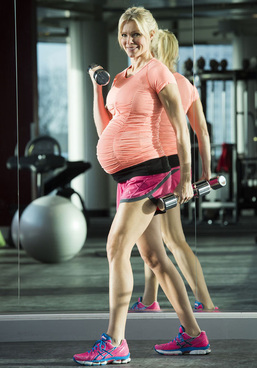


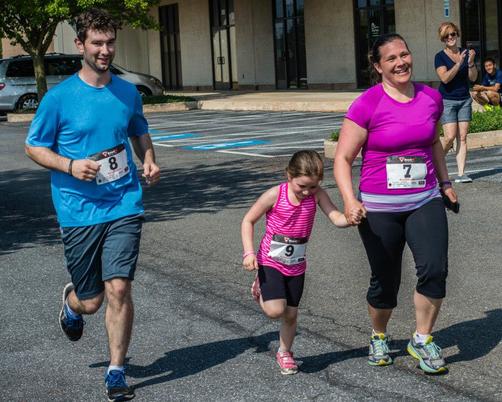

 RSS Feed
RSS Feed